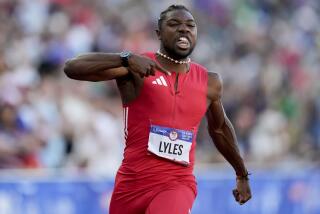Oscar Pistorius runs into the Olympic spotlight
- Share via
Every Olympics has at least one story that leaves a giant, enduring footprint.
Just guessing, but this summer it will be about the sprinter with no feet.
Earlier this week the news slipped under a radar blinking madly with NBA trade talk, but the announcement from South Africa will soon blind the world with its shocking, silvery glint.
Competing in London next month in the 400-meter dash and 1,600-meter relay will be a double amputee with no lower legs, a guy who races on carbon-fiber prosthetic blades, an imperfect athlete with the most perfect of nicknames.
Oscar Pistorius, the “Blade Runner,” will be running for South Africa in the Olympics, and though you may have followed his inspirational story before, it is nearly impossible to imagine where it is going to take us now.
On Aug. 4 at London’s Olympic Stadium, amid a lineup of able-bodied competitors, a man is going to step into the 400-meter starting blocks while standing atop two rubbery blades. That man will then sprint around the track on those blades in an attempt to outrace those with “normal” lower legs.
Pistorius will not win. He did not win the African championships last week, and even failed to reach the South African Olympic standard. But earlier this year he beat the overall Olympic qualifying time, and at last year’s world championships he was part of a silver-medal relay team, so the South African Olympic committee added him as that country’s 125th and final track participant.
Pistorius will not win, but he will probably author the Olympics’ most astonishing moments -- just check out videos of some of his former races, which show the normal running motions of a normal athlete who appears to have the lower half of a robot.
He will be the cause of much staring, much cheering, and a whopper of a debate.
Does a guy with artificial lower legs have an unfair advantage over athletes with real ones?
It is, at once, a fair question and a silly one. Science may demonstrate that the blades offer some advantage, but his overwhelming physical disadvantages surely even the score.
As recently as five years ago, track’s international governing body determined that the blades allowed him to expend less energy than able-bodied competitors, and thus amended its rules to ban Pistorius from competition. A year later, the Court of Arbitration for Sport ruled that he did not have a quantifiable advantage, and he was allowed back in the race.
I brought the debate to two of UCLA’s renowned brains Thursday, and neither could hide his amazement.
“My mind is racing ? how is he doing that?” said Vijay Gupta, professor of mechanical and aerospace engineering, as he watched a Pistorius video.
After spending time studying Pistorius’ motion, Gupta conceded he had a “very subtle advantage” in that the curvature of the blades allowed him to remain in longer contact with the track and thus propel himself slightly faster than someone with feet.
“Whoever designed those blades is very smart,” Gupta said. “He can use them to generate more power from the ground.”
Gupta added, however, that there are disadvantages in having an upper body that is attached to a mechanical lower leg.
“Watch his upper leg slightly move where the device is attached,” Gupta said. “There is some instability in the biomechanics, which is something other runners don’t deal with.”
Reggie Edgerton, professor of integrative biology and physiology, said simply, “There might be a slight advantage, but it is outweighed by the obvious disadvantage, and I would let him run.”
Pistorius will still be the subject of controversy in London, not only by his mere presence, but by the order in which he runs the relay. Track officials have been outspoken in their fear that if he does not run the first leg, he could get caught in the middle of the pack and risk injuring other runners with his sharp prosthetics.
It’s all so crazy, and you want unfair? Pistorius, 25, was born with congenital absence of the fibula in both legs, which were amputated below the knee when he was 11 months old. He was told he would never stand. He was told to never play sports.
Thank goodness he never did what he was told.
“Thank you to everyone that has made me the athlete I am!” Pistorius tweeted after being named to the Olympic team. “God, family and friends, my competitors and supporters! You have all had a hand!”
On Aug. 4 at London’s Olympic Stadium, he’s getting one from me.
twitter.com/billplaschke
More to Read
Go beyond the scoreboard
Get the latest on L.A.'s teams in the daily Sports Report newsletter.
You may occasionally receive promotional content from the Los Angeles Times.











